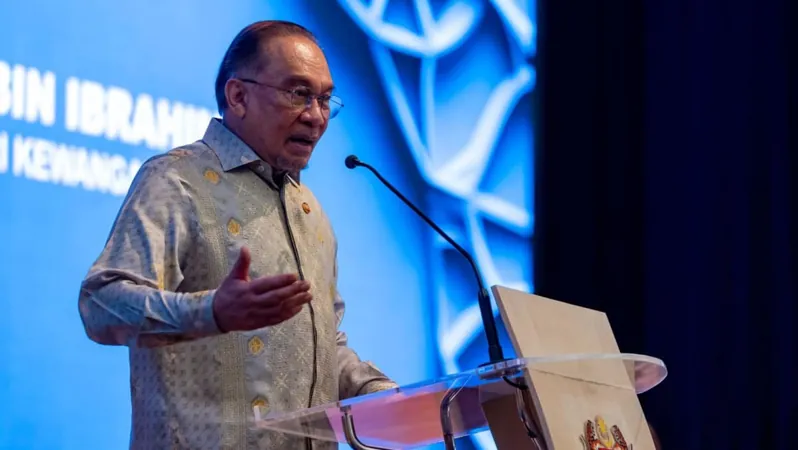
Political Controversy Erupts Over Anwar's $230 Million Rescue Package for Struggling Sapura Energy
2025-03-23
Author: Wei Ling
Introduction
The Malaysian government’s controversial $230 million (RM1.1 billion) lifeline to Sapura Energy Bhd, once a leading oil and gas services company, has ignited a fiery debate surrounding Prime Minister Anwar Ibrahim's integrity as he grapples with his past promises to end the use of public funds for rescuing troubled businesses.
Concerns and Criticism
Concerns voiced by financial experts, political adversaries, and even members from Anwar's own party underscore fears that this proposed rescue is driven more by political necessity than economic rationale. “This cash injection is likely just the first of many handouts that Sapura will need to stay afloat,” warned a Kuala Lumpur financial consultant. They pointed towards contracts from the national oil corporation, Petronas, as potential future financial lifelines.
Government Intervention
Hassan Abdul Karim, a parliamentarian from Anwar's Parti Keadilan Rakyat, defined the government’s intervention as a clear "bailout," emphasizing in media statements that regardless of the government’s interpretation, the action equates to “saving” a failing entity.
Anwar's Past Statements
This reality becomes especially complicated given Anwar's track record as a vocal critic of financial bailouts. When he was the opposition leader, he previously condemned any similar rescue operations without a thorough audit of mismanagement. The juxtaposition of his past statements with current actions creates an additional layer of political complexity.
Strategic Investment?
Anwar, however, has characterized the bailout as a "strategic investment" intended to sustain not just Sapura Energy, but also the ecosystem of local bumiputera suppliers who are at risk due to the company's financial instability. With Sapura's dismal financial reports revealing RM17.6 billion in losses from 2020 to 2024, many are questioning the viability of the rescue.
Public Reaction and Comparison
Financial analysts note that the capital injection is substantially more palatable than prior administrations' bailouts, which often favored select business elites connected to the government. Notably, during Mahathir Mohamad’s lengthy rule, multiple high-profile rescues led to taxpayer foot-the-bill scenarios, raising eyebrows and distrust among the public.
Skepticism from Banks
Despite attempts to justify the Sapura Energy bailout, some banks are expressing skepticism. The company is currently considered insolvent, with liabilities exceeding its assets, sparking fears that this might set a dangerous precedent for the Ministry of Finance acting as a “lender of last resort.” Critics suggest the approach may embolden other firms to similarly seek government assistance rather than financial restructuring through conventional means.
Political Implications
The political implications are significant. With Sapura Energy being partly controlled by state-owned Permodalan Nasional Bhd (PNB) and its contractors predominantly comprising ethnic Malays, Anwar risks alienating various political factions at a time when he struggles to maintain popular support.
Mechanics of the Rescue
In the mechanics of the rescue, Sapura Energy is preparing to issue redeemable convertible loan notes to the Ministry of Finance, which will fund necessary payments to contractors, thus allowing the restructuring of its significant debts owed to major lenders like Maybank and CIMB. Analysts predict that post-restructuring, the company's liabilities might be reduced from RM10 billion to RM5.2 billion, but the road ahead would still be fraught with challenges and regulatory hurdles.
Company's Decline
Sapura Energy once flourished after merging in 2012, securing major contracts globally. However, since the oil price collapse in 2014, the company has faced mounting financial distress, prompting previous investment from PNB that also failed to reverse its fortunes.
Conclusion
As the situation unfolds, the future of both Sapura Energy and Anwar's political legitimacy hangs in the balance, forcing the Prime Minister to navigate treacherous waters in a divided political landscape while attempting to fulfill the very promises he campaigned upon. The implications are vast, not only for the government but for the broader economic health of Malaysia.




 Brasil (PT)
Brasil (PT)
 Canada (EN)
Canada (EN)
 Chile (ES)
Chile (ES)
 Česko (CS)
Česko (CS)
 대한민국 (KO)
대한민국 (KO)
 España (ES)
España (ES)
 France (FR)
France (FR)
 Hong Kong (EN)
Hong Kong (EN)
 Italia (IT)
Italia (IT)
 日本 (JA)
日本 (JA)
 Magyarország (HU)
Magyarország (HU)
 Norge (NO)
Norge (NO)
 Polska (PL)
Polska (PL)
 Schweiz (DE)
Schweiz (DE)
 Singapore (EN)
Singapore (EN)
 Sverige (SV)
Sverige (SV)
 Suomi (FI)
Suomi (FI)
 Türkiye (TR)
Türkiye (TR)
 الإمارات العربية المتحدة (AR)
الإمارات العربية المتحدة (AR)